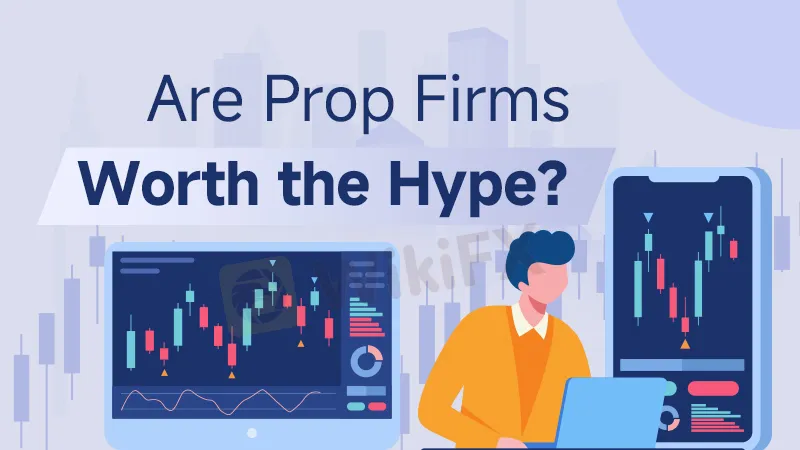简体中文
繁體中文
English
Pусский
日本語
ภาษาไทย
Tiếng Việt
Bahasa Indonesia
Español
हिन्दी
Filippiiniläinen
Français
Deutsch
Português
Türkçe
한국어
العربية
Are Prop Firms Worth the Hype?
Abstract:Proprietary trading firms, commonly known as prop firms, have been gaining attention in the forex and cryptocurrency industry. These firms recruit traders to trade with their capital, offering potentially lucrative opportunities. However, the question arises: Are prop firms truly worth the hype?

Proprietary trading firms, commonly known as prop firms, have been gaining attention in the forex and cryptocurrency industry. These firms recruit traders to trade with their capital, offering potentially lucrative opportunities. However, the question arises: Are prop firms truly worth the hype?
Prop firms operate on the premise of providing traders with access to significant capital and resources, allowing them to leverage their trading strategies for potentially higher returns. In return, traders typically share a portion of their profits with the firm. This arrangement can be appealing to traders looking to trade with larger sums of money than they might have access to individually.
One of the primary advantages touted by prop firms is the ability for traders to access substantial leverage. With increased leverage, traders can amplify their potential profits, but it also comes with heightened risk. It's essential for traders to fully understand and manage the risks associated with trading on leverage, as significant losses can occur just as easily as significant gains.
Another aspect of prop firms that garners attention is the access to advanced trading technology and infrastructure. These firms often provide traders with state-of-the-art trading platforms, analytics tools, and direct market access, which can enhance their trading capabilities. Additionally, prop firms may offer training programs and mentorship opportunities to help traders improve their skills and performance.

While prop firms can offer valuable opportunities for traders, it's essential to acknowledge the potential risks associated with them. One significant concern is the risk of prop firms engaging in fraudulent activities or taking advantage of their trading clients. Instances of misconduct, such as misappropriation of funds, market manipulation, or unfair trading practices, can pose serious risks to traders' capital and reputation. Therefore, traders should exercise due diligence when selecting a prop firm, ensuring that they are reputable, regulated, and adhere to ethical standards in their operations. Additionally, maintaining transparency and open communication with the firm can help mitigate the risk of fraudulent behaviour and promote a mutually beneficial trading relationship.
Furthermore, traders can face significant losses, especially when trading on leverage. It's crucial for traders to have a solid understanding of risk management principles and to trade responsibly to mitigate potential losses.
In conclusion, prop firms offer traders the opportunity to access significant capital, leverage, and resources, which can potentially enhance their trading performance. However, traders should carefully consider the risks and implications of profit-sharing arrangements and leverage before joining a prop firm. Ultimately, whether prop firms are worth the hype depends on individual traders' goals, risk tolerance, and trading preferences.

Disclaimer:
The views in this article only represent the author's personal views, and do not constitute investment advice on this platform. This platform does not guarantee the accuracy, completeness and timeliness of the information in the article, and will not be liable for any loss caused by the use of or reliance on the information in the article.
Read more

Thinking of Investing? Read Must-Know Facts About Funding pips!
When you check the internet for Funding Pips, you'd be surprised to know it's filled with praise for Funding Pips but often lacks the real facts that traders need. Everything that seems too good to be true should always be verified first. It could be Fraud . So, we conducted research and collected several facts you must know about Funding Pips.

OctaFX Back in News: ED Attaches Assets Worth INR 134 Cr in Forex Scam Case
The Enforcement Directorate (ED) in Mumbai has attached assets worth around INR 131.45 crore. This included a luxury yacht and residential properties in Spain. Read this interesting story.

Truth About Angel One – Here’s What You Need to Know
Thinking about investing in Angel One? Wait! Know the essential things about the broker before Invest. It could be SCAM. Read, think, and invest .

OANDA Rebrands TMS Brokers in Lithuania and Latvia Forex Markets
OANDA upgrades Baltic forex with TMS Brokers rebranding and new mobile app for enhanced trading technologies in Europe.
WikiFX Broker
Latest News
Tokenized Stocks: Innovation or Just Another Wrapper?
Gold Rush Again: What's Driving the Bullion Market Crazy Ahead of US Jobs Data?
XTB Launches Tax-Advantaged Retirement Accounts in Poland
Zaffex Broker Review
ECB Ends Easing Cycle, But The Eurozone Crisis Is Just Beginning
Amazon deploys its 1 millionth robot in a sign of more job automation
MT4 and MT5 Platforms - Helping Traders Up Their Forex Trading Game
A bare-bones deal is Europe's best hope in trade talks with the U.S., sources say
10-year Treasury yield remains higher despite weak ADP jobs report
Blueberry Markets Revamps its Website
Currency Calculator


